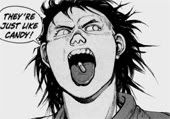

|
Korean Job Discussion Forums
"The Internet's Meeting Place for ESL/EFL Teachers from Around the World!"
|
| View previous topic :: View next topic |
| Author |
Message |
Jove
Joined: 20 Apr 2003
Location: Over the hill
|
 Posted: Wed Dec 07, 2005 4:39 pm Post subject: "Hate Korea" trend in Japan: NYTimes article Posted: Wed Dec 07, 2005 4:39 pm Post subject: "Hate Korea" trend in Japan: NYTimes article |
 |
|
This article was brought to my attention by my father. After living here for years and hearing continually xenophobic comments from Koreans about a variety of nationalities; westerners comments about how stupid and xenophobic Koreans are, I can see why the rest of Asia, and Korea in particular, are constantly at odds with Japan. Granted, this is a minority, but as with politics and relationships throughout the world, the loudest and ugliest minorities tend to get heard the most. In the end, I think it is generally about fear and ignorance, but it is a mighty sad way to live one's life.
Ugly Images of Asian Rivals Become Best Sellers in Japan
By NORIMITSU ONISHI (NYT) 1517 words
Published: November 19, 2005
CORRECTION APPENDED
A young Japanese woman in the comic book ''Hating the Korean Wave'' exclaims, ''It's not an exaggeration to say that Japan built the South Korea of today!'' In another passage the book states that ''there is nothing at all in Korean culture to be proud of.''
In another comic book, ''Introduction to China,'' which portrays the Chinese as a depraved people obsessed with cannibalism, a woman of Japanese origin says: ''Take the China of today, its principles, thought, literature, art, science, institutions. There's nothing attractive.''
The two comic books, portraying Chinese and Koreans as base peoples and advocating confrontation with them, have become runaway best sellers in Japan in the last four months.
In their graphic and unflattering drawings of Japan's fellow Asians and in the unapologetic, often offensive contents of their speech bubbles, the books reveal some of the sentiments underlying Japan's worsening relations with the rest of Asia.
They also point to Japan's longstanding unease with the rest of Asia and its own sense of identity, which is akin to Britain's apartness from the Continent. Much of Japan's history in the last century and a half has been guided by the goal of becoming more like the West and less like Asia. Today, China and South Korea's rise to challenge Japan's position as Asia's economic, diplomatic and cultural leader is inspiring renewed xenophobia against them here.
Kanji Nishio, a scholar of German literature, is honorary chairman of the Japanese Society for History Textbook Reform, the nationalist organization that has pushed to have references to the country's wartime atrocities eliminated from junior high school textbooks.
Mr. Nishio is blunt about how Japan should deal with its neighbors, saying nothing has changed since 1885, when one of modern Japan's most influential intellectuals, Yukichi Fukuzawa, said Japan should emulate the advanced nations of the West and leave Asia by dissociating itself from its backward neighbors, especially China and Korea.
''I wonder why they haven't grown up at all,'' Mr. Nishio said. ''They don't change. I wonder why China and Korea haven't learned anything.''
Mr. Nishio, who wrote a chapter in the comic book about South Korea, said Japan should try to cut itself off from China and South Korea, as Fukuzawa advocated. ''Currently we cannot ignore South Korea and China,'' Mr. Nishio said. ''Economically, it's difficult. But in our hearts, psychologically, we should remain composed and keep that attitude.''
The reality that South Korea had emerged as a rival hit many Japanese with full force in 2002, when the countries were co-hosts of soccer's World Cup and South Korea advanced further than Japan. At the same time, the so-called Korean Wave -- television dramas, movies and music from South Korea -- swept Japan and the rest of Asia, often displacing Japanese pop cultural exports.
The wave, though popular among Japanese women, gave rise to a countermovement, especially on the Internet. Sharin Yamano, the young cartoonist behind ''Hating the Korean Wave,'' began his strip on his own Web site then.
''The 'Hate Korea' feelings have spread explosively since the World Cup,'' said Akihide Tange, an editor at Shinyusha, the publisher of the comic book. Still, the number of sales, 360,000 so far, surprised the book's editors, suggesting that the Hate Korea movement was far larger than they had believed.
''We weren't expecting there'd be so many,'' said Susumu Yamanaka, another editor at Shinyusha. ''But when the lid was actually taken off, we found a tremendous number of people feeling this way.''
So far the two books, each running about 300 pages and costing around $10, have drawn little criticism from public officials, intellectuals or the mainstream news media. For example, Japan's most conservative national daily, Sankei Shimbun, said the Korea book described issues between the countries ''extremely rationally, without losing its balance.''
As nationalists and revisionists have come to dominate the public debate in Japan, figures advocating an honest view of history are being silenced, said Yutaka Yoshida, a historian at Hitotsubashi University here. Mr. Yoshida said the growing movement to deny history, like the Rape of Nanjing, was a sort of ''religion'' for an increasingly insecure nation.
''Lacking confidence, they need a story of healing,'' Mr. Yoshida said. ''Even if we say that story is different from facts, it doesn't mean anything to them.''
The Korea book's cartoonist, who is working on a sequel, has turned down interview requests. The book centers on a Japanese teenager, Kaname, who attains a ''correct'' understanding of Korea. It begins with a chapter on how South Korea's soccer team supposedly cheated to advance in the 2002 Word Cup; later chapters show how Kaname realizes that South Korea owes its current success to Japanese colonialism.
''It is Japan who made it possible for Koreans to join the ranks of major nations, not themselves,'' Mr. Nishio said of colonial Korea.
But the comic book, perhaps inadvertently, also betrays Japan's conflicted identity, its longstanding feelings of superiority toward Asia and of inferiority toward the West. The Japanese characters in the book are drawn with big eyes, blond hair and Caucasian features; the Koreans are drawn with black hair, narrow eyes and very Asian features.
That peculiar aesthetic, so entrenched in pop culture that most Japanese are unaware of it, has its roots in the Meiji Restoration of the late 19th century, when Japanese leaders decided that the best way to stop Western imperialists from reaching here was to emulate them.
In 1885, Fukuzawa -- who is revered to this day as the intellectual father of modern Japan and adorns the 10,000 yen bill (the rough equivalent of a $100 bill) -- wrote ''Leaving Asia,'' the essay that many scholars believe provided the intellectual underpinning of Japan's subsequent invasion and colonization of Asian nations.
Fukuzawa bemoaned the fact that Japan's neighbors were hopelessly backward.
Writing that ''those with bad companions cannot avoid bad reputations,'' Fukuzawa said Japan should depart from Asia and ''cast our lot with the civilized countries of the West.'' He wrote of Japan's Asian neighbors, ''We should deal with them exactly as the Westerners do.''
As those sentiments took root, the Japanese began acquiring Caucasian features in popular drawing. The biggest change occurred during the Russo-Japanese War of 1904 to 1905, when drawings of the war showed Japanese standing taller than Russians, with straight noses and other features that made them look more European than their European enemies.
''The Japanese had to look more handsome than the enemy,'' said Mr. Nagayama.
Many of the same influences are at work in the other new comic book, ''An Introduction to China,'' which depicts the Chinese as obsessed with cannibalism and prostitution, and has sold 180,000 copies.
The book describes China as the ''world's prostitution superpower'' and says, without offering evidence, that prostitution accounts for 10 percent of the country's gross domestic product. It describes China as a source of disease and depicts Prime Minister Junichiro Koizumi saying, ''I hear that most of the epidemics that broke out in Japan on a large scale are from China.''
The book waves away Japan's worst wartime atrocities in China. It dismisses the Rape of Nanjing, in which historians say 100,000 to 300,000 Chinese were killed by Japanese soldiers in 1937-38, as a fabrication of the Chinese government devised to spread anti-Japanese sentiment.
The book also says the Japanese Imperial Army's Unit 731 -- which researched biological warfare and conducted vivisections, amputations and other experiments on thousands of Chinese and other prisoners -- was actually formed to defend Japanese soldiers against the Chinese.
''The only attractive thing that China has to offer is Chinese food,'' said Ko Bunyu, a Taiwan-born writer who provided the script for the comic book. Mr. Ko, 66, has written more than 50 books on China, some on cannibalism and others arguing that Japanese were the real victims of their wartime atrocities in China. The book's main author and cartoonist, a Japanese named George Akiyama, declined to be interviewed.
Like many in Taiwan who are virulently anti-China, Mr. Ko is fiercely pro-Japanese and has lived here for four decades. A longtime favorite of the Japanese right, Mr. Ko said anti-Japan demonstrations in China early this year had earned him a wider audience. Sales of his books surged this year, to one million.
''I have to thank China, really,'' Mr. Ko said. ''But I'm disappointed that the sales of my books could have been more than one or two million if they had continued the demonstrations.''
Correction: November 22, 2005, Tuesday Because of an editing error, a front-page article on Saturday about the popularity of comic books in Japan that unfavorably portray Chinese and Koreans omitted the full name and background of a person who was quoted as saying that Japanese artists portrayed Russians in similarly unfavorable ways during the 1904-05 Russo-Japanese war. He is Yasuo Nagayama, a Japanese author who has written on popular culture during that war. |
|
| Back to top |
|
 |
vlcupper

Joined: 12 Aug 2004
Location: Gangnam
|
 Posted: Wed Dec 07, 2005 6:04 pm Post subject: Posted: Wed Dec 07, 2005 6:04 pm Post subject: |
 |
|
Holy cow. I never expected something like this from the Japanese. Korean media, sure. But the Japanese. Wow.
Wait, doesn't Sun Young Moon own part of the New York Times or is it the LA Times? |
|
| Back to top |
|
 |
Ya-ta Boy
Joined: 16 Jan 2003
Location: Established in 1994
|
 Posted: Wed Dec 07, 2005 6:15 pm Post subject: Posted: Wed Dec 07, 2005 6:15 pm Post subject: |
 |
|
| There is a discussion about this article around here somewhere. |
|
| Back to top |
|
 |
just because

Joined: 01 Aug 2003
Location: Changwon - 4964
|
 Posted: Wed Dec 07, 2005 8:16 pm Post subject: Posted: Wed Dec 07, 2005 8:16 pm Post subject: |
 |
|
It was written by a Korean who is a naturalized japanese person(zainichi) but has a hate on for Japan.....
he is quite well known for his anti-Japanese stance, this being a good example and the book has been taken out of context...it is obvious the writer is just looking for sensationalism |
|
| Back to top |
|
 |
Shooter McGavin
Joined: 22 Nov 2005
Location: ROK
|
 Posted: Wed Dec 07, 2005 8:29 pm Post subject: Re: "Hate Korea" trend in Japan: NYTimes article Posted: Wed Dec 07, 2005 8:29 pm Post subject: Re: "Hate Korea" trend in Japan: NYTimes article |
 |
|
| Jove wrote: |
The wave, though popular among Japanese women, gave rise to a countermovement, especially on the Internet. Sharin Yamano, the young cartoonist behind ''Hating the Korean Wave,'' began his strip on his own Web site then.
|
Count me in. K-pop is f'in horrible.
However, there's no denying that the Japanese downplay and even deny their colonial past. The PM's visits to Yasukuni really strike a cord too, as they are similar to what would happen if Merckel went to a monument to German war dead that had names like Goebbels on it. |
|
| Back to top |
|
 |
itaewonguy

Joined: 25 Mar 2003
|
 Posted: Wed Dec 07, 2005 9:28 pm Post subject: Posted: Wed Dec 07, 2005 9:28 pm Post subject: |
 |
|
[quoteThe wave, though popular among Japanese women, gave rise to a countermovement, especially on the Internet. Sharin Yamano, the young cartoonist behind ''Hating the Korean Wave,'' began his strip on his own Web site then.
][/quote]
well atleast the japanese accept things korean.. where the koreans dont really take on much japanese music or media. compared to the japanese media.
thats becuase Korean media wouldnt like it.. they love to sell boa and the others over there if its in their interests but when foreigners try to do it here im sure they are restricted...
Japanese hate korea? so what! Koreans hate them and everyone else too so how really gives a shit.. |
|
| Back to top |
|
 |
billybrobby

Joined: 09 Dec 2004
|
 Posted: Wed Dec 07, 2005 10:02 pm Post subject: Posted: Wed Dec 07, 2005 10:02 pm Post subject: |
 |
|
| just because wrote: |
It was written by a Korean who is a naturalized japanese person(zainichi) but has a hate on for Japan.....
he is quite well known for his anti-Japanese stance, this being a good example and the book has been taken out of context...it is obvious the writer is just looking for sensationalism |
i looked around for onishi's biography but couldn't find it. where did you find it? |
|
| Back to top |
|
 |
shakuhachi

Joined: 08 Feb 2003
Location: Sydney
|
 Posted: Wed Dec 07, 2005 10:06 pm Post subject: Posted: Wed Dec 07, 2005 10:06 pm Post subject: |
 |
|
| I read and reviewed the comic on my blog here. I also discuss the NYT article here and here. |
|
| Back to top |
|
 |
billybrobby

Joined: 09 Dec 2004
|
 Posted: Wed Dec 07, 2005 11:40 pm Post subject: Posted: Wed Dec 07, 2005 11:40 pm Post subject: |
 |
|
well, i did some more digging on onishi, but no luck. all i learned was this:
1. he is hated by a lot of bloggers
2. he was part of some pulitzer prize winning thingy
but what is the story? he's a korean, his parents give him a japanese name, and then have him grow up in an english speaking country (maybe)? doesn't make sense. |
|
| Back to top |
|
 |
I_Am_Wrong
Joined: 14 Sep 2004
Location: whatever
|
 Posted: Wed Dec 07, 2005 11:50 pm Post subject: Posted: Wed Dec 07, 2005 11:50 pm Post subject: |
 |
|
| People have this strange idea in their heads for some reason. Korea is severly stereotyped about it's attitudes and xenophobia whereas, they have this idea that it doesn't exist in Japan. You see it in all areas: Korea is dirty and there is lots of trash in the street but Japan is clean. Well...when I was in Osaka I saw more trash on the street than even Jakarta! Japan has just as much xenophobia, racism, and whatever as every other country on the face of the planet including Korea...Korea isn't an exception. In fact, I find it to be quite low in general in Korea. Korea's products are seriously threatening Japan's dominance in electronics and Japan's attitude towards Korea is going to continue to reflect that. Keep in mind that the goal for Korea is to eventually overtake Japan and Samsung is already doing that in lots of areas. All the major Japanese companies already buy all their memory and LCD screens from Samsung. |
|
| Back to top |
|
 |
On the other hand
Joined: 19 Apr 2003
Location: I walk along the avenue
|
 Posted: Thu Dec 08, 2005 12:32 am Post subject: Posted: Thu Dec 08, 2005 12:32 am Post subject: |
 |
|
| Quote: |
Wait, doesn't Sun Young Moon own part of the New York Times or is it the LA Times?
|
Moon is the owner of The Washington Times, which as far as I know never turns a profit. It isn't really considered a paper of record, in the way that the NYT or LA Times is. More of a conservative mouthpiece along the lines of FOX News.
I don't think that Moon has anything to do with the NYT or the LAT. |
|
| Back to top |
|
 |
|
|
You cannot post new topics in this forum
You cannot reply to topics in this forum
You cannot edit your posts in this forum
You cannot delete your posts in this forum
You cannot vote in polls in this forum
|
|

